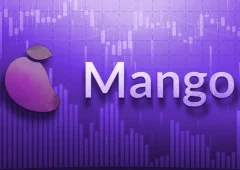Blast Network Faces Severe Drop in TVL and User Activity
21.08.2024 10:30 1 min. read Alexander Stefanov
Blast Network, an Ethereum layer-2 scaling solution, is experiencing significant setbacks, with major declines in both its total value locked (TVL) and daily active users, raising doubts about its long-term viability.
Recently, Blast’s TVL has plummeted by an alarming 62% from its peak, following a substantial $300 million liquidity loss reported in early August.
The network’s woes are further underscored by a sharp drop in daily active users, which had fallen to 27,800 as of August 18—the lowest since Blast began its expansion in late February. This is in stark contrast to competitors like Base and Arbitrum, which boast 740,000 and 360,000 daily active wallets, respectively.
This user decline follows a problematic airdrop in June and growing dissatisfaction among users and developers.
Prominent projects such as Pacmoon, the largest memecoin on Blast’s network, are now seeking alternatives. Pacmoon’s Lamboland criticized Blast for its lack of community and cultural engagement, stating,
“Blast failed to address these crucial aspects and built a system that focused on token creation without providing necessary social support.”
Furthermore, the network has faced criticism over its launch approach, notably the bridge feature, which left users unable to withdraw their funds for a prolonged period.
-
1
Top 10 blockchains by transaction volume in June 2025
06.07.2025 16:00 2 min. read -
2
German State-Owned Development Bank Issues €100 Million Blockchain Bond
11.07.2025 7:00 2 min. read -
3
Tether Ends Support for Five Blockchains in Infrastructure Shift
12.07.2025 11:30 2 min. read -
4
Cardano and Ethereum Lead in Developer Activity as GitHub Commits Surge
14.07.2025 12:00 1 min. read -
5
Malaysia Opens the Door to Blockchain Experimentation With Launch of Innovation Hub
18.06.2025 22:00 2 min. read
How to Earn Yield Holding USDC: A 2025 Guide
If you’re holding USDC and want to maximize your yield, Deribit now offers rewards for eligible users who store USDC on its platform.
Kazakhstan May Invest Gold Reserves in Crypto Sector
Kazakhstan is considering allocating a portion of its gold and foreign currency reserves, along with National Fund assets, into crypto-related investments.
Grayscale Confidentially Files for New SEC-registered Offering Amid Growing Crypto Market demand
Grayscale Investments announced today that it has confidentially submitted a draft registration statement on Form S-1 to the U.S.
Here is How to Read the Crypto Fear and Greed Index
In the volatile world of cryptocurrency, investor psychology is one of the most powerful forces behind price movement.
-
1
Top 10 blockchains by transaction volume in June 2025
06.07.2025 16:00 2 min. read -
2
German State-Owned Development Bank Issues €100 Million Blockchain Bond
11.07.2025 7:00 2 min. read -
3
Tether Ends Support for Five Blockchains in Infrastructure Shift
12.07.2025 11:30 2 min. read -
4
Cardano and Ethereum Lead in Developer Activity as GitHub Commits Surge
14.07.2025 12:00 1 min. read -
5
Malaysia Opens the Door to Blockchain Experimentation With Launch of Innovation Hub
18.06.2025 22:00 2 min. read


